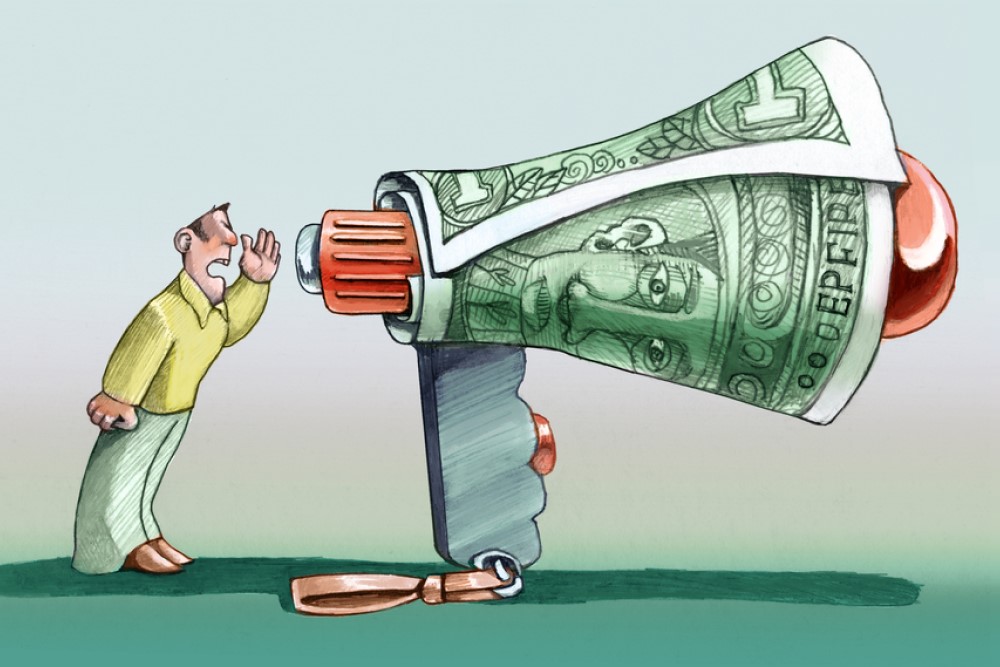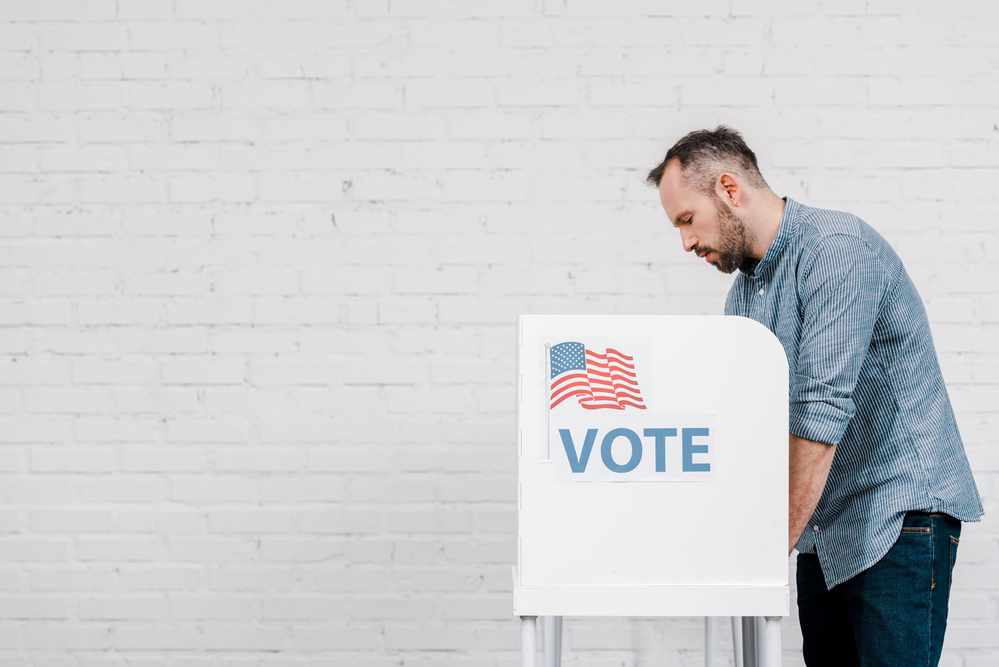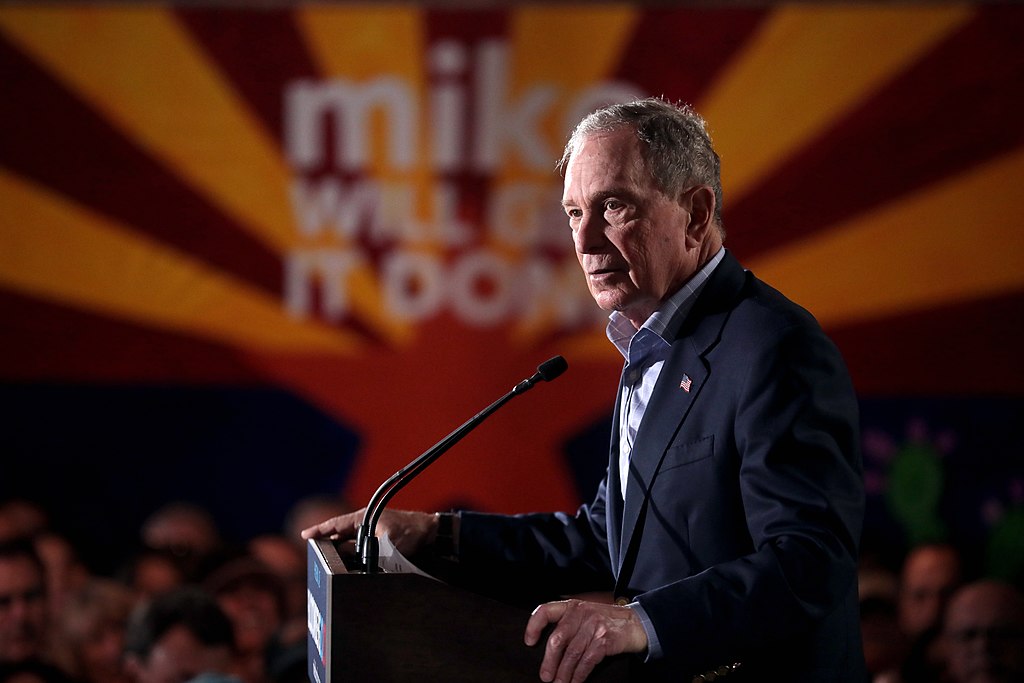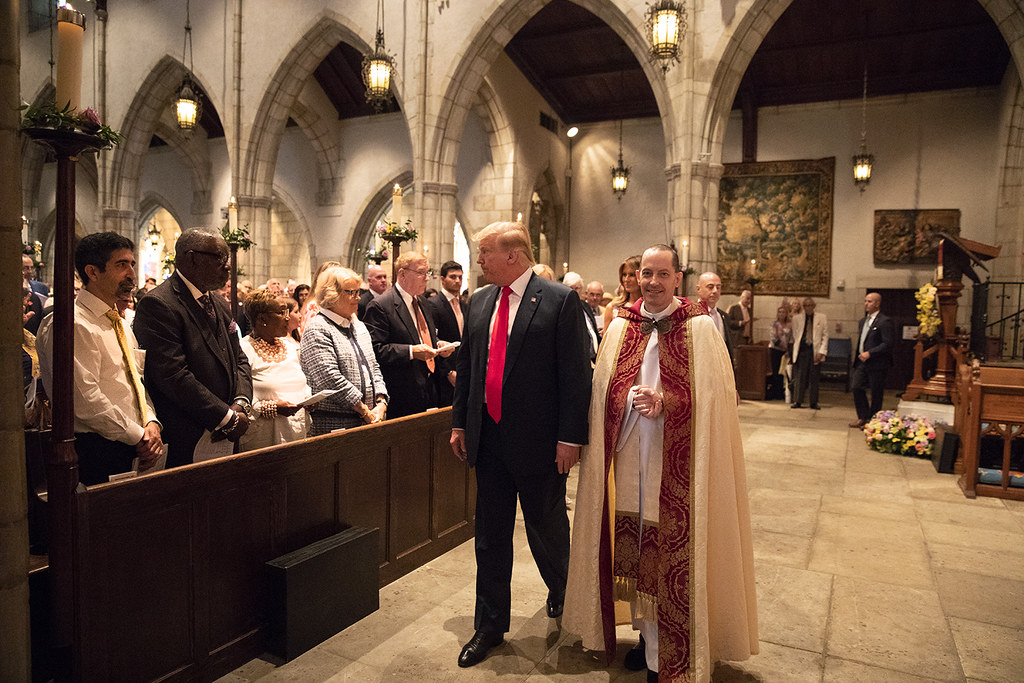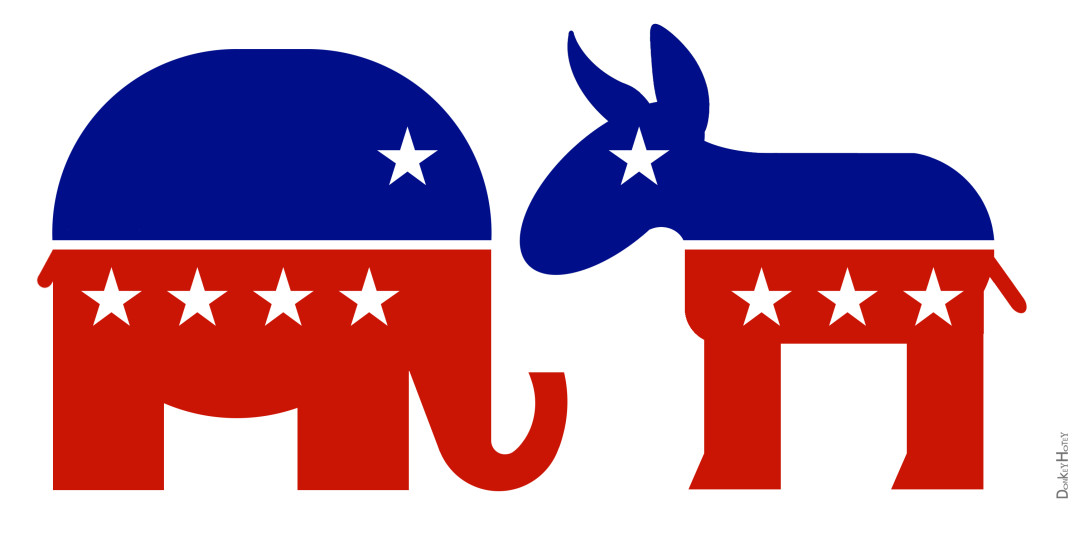This piece is part of a Considered Position series that reflects on the United States’ claim to being a “flawed democracy.” To see the earlier segments, start here.
We’ve spent a great deal of time here and here, discussing ways that the current US electoral system leads to the abuse of minority rights. However, certain minorities hold an enormous and disproportionate influence on politics. In previous sections, we’ve tended to use “minority” to mean a group that has a minority of the political power, regardless of its share of the population. In this next section we will be considering a different kind of minority, one that comprises only a tiny fraction of the population but which holds a significant amount of the political power. I am speaking, of course, of the rich and of corporations and the influence of their money in politics. We will consider in turn how money is used to influence politics, the fairly recent Citizens United decision that greatly increased this influence, and some potential solutions that minimize the difference in political power between the rich and the poor.
Lobbying
Once, the US federal government was a lot more corrupt than it is now. People complain nowadays about lobbying but lobbyists only offer, or threaten to take away, campaign donations. And while sometimes politicians use their campaign money on personal expenses, this is not terribly common. Back in the late 1800s, in the so-called “Gilded Age,” politicians were wildly corrupt. In 1886, the President Rutherford B. Hayes wrote in his diary, referencing Lincoln, “This is a government of the people, by the people and for the people no longer. It is a government by the corporations, of the corporations and for the corporations.” This was the most explicit form of corruption, quid pro quo, literally “this for that.” Corporations consciously bribed politicians who gladly took the bribes. Nowadays, thankfully, quid pro quo corruption has been greatly reigned in. However, a systemic and more subtle sort of corruption remains.
Citizen Lobbying
This is the institution of corporate lobbying. Lobbying isn’t a bad thing. Anyone can lobby. “Lobbying” just means taking action to persuade an elected official to vote one way or another on a certain piece of legislation. And it is central to American democracy. The practice is protected by the First Amendment (not Article the First) where it is written that “Congress shall make no law. . . abridging . . . the right of the people. . . to petition the Government for a redress of grievances.” Anyone can do it, either by calling or writing individually to your congressperson or as part of a group, such as Mothers Against Drunk Driving. That organization successfully lobbied the federal government to raise the drinking age to 21. This was a good example of lobbying gone well. Increasing the drinking age was widely popular and remains so today.
Now all sorts of lobbying does have certain broad problems too. In general, lobbying results in politicians acting not according to the will of all of their constituents, or even the majority. Rather, politicians will tend to act in accordance with whichever citizen lobbying groups are most vocal. See, polls are expensive and sometimes inaccurate. But some people will voluntarily call their congressperson, or write to them, and make their opinions known. This may also be inaccurate but at least it’s cheap. Suppose that only 20 percent of a district’s constituents really support defunding Planned Parenthood. But if those 20 percent all call and write to you while, of the other 80 percent, only 10 percent contact you, it will seem like more than two-thirds of your constituents want Planned Parenthood defunded and so maybe you the congressperson will vote in support of some legislation doing just that. This is undemocratic. The minority is having their interests put ahead of the majority. But, on the other hand, it’s not the fault of the citizen lobbyists. Other, less-vocal citizens are free to speak up. They just don’t. And if a congressperson votes in accordance with those who speak up, she might be justified: those who call or write may care more and maybe those who care more should have their interests represented more commonly than those who don’t care enough to reach out.
However, economic circumstance, rather than just care, can affect who lobbies too. Consider this: everyone has the time to call or write their congressperson every once in a while. But who has the time to lobby for hours a day? The only ones who can do this are the ones who don’t have to work a normal job. And these will be the wealthy, non-working spouses, and those who are retired. These groups will have their interests overrepresented. Even if you care, if you have to work many hours a day, you’re not going to be able to make your interests known as effectively as these groups can. This seems to be unjustly undemocratic. Conventionally, we don’t think you deserve more political power just because you have more money.
Small Business Lobbying
The bigger problem, then, comes with groups that tend to have lots of money. I mean of course corporations. In 2018, $3.4 billion dollars, an unimaginable sum, was spent on lobbying at the federal, state, and local level. In its most basic form, corporate lobbying can be as innocuous as citizen lobbying. A small business, with only a handful of employees donating a few thousand dollars to a candidate who supports small businesses doesn’t seem to be doing much wrong. Now that’s still more money than most people will contribute to political campaigns. In fact, the vast majority of people don’t donate any money to political campaigns.
And, while there seems to be little problem with small businesses spending small amounts of money on local elections, when those small businesses ally with other businesses, large and small, and pool their money through large lobbying organizations, they can have enormous undue influence. The largest lobbying group is the deceptively named “US Chamber of Commerce,” which is an association of 3 million businesses of varying sizes. This group spent nearly $100 million on federal lobbying in 2018. They consistently support Republicans, having spent 93 percent of their lobbying money supporting them in the 2010 elections. And, 94 percent of those they support deny climate change.
Given that climate change is a problem that hurts all of us, including business owners, we are also forced to wonder, in whose interest are these corporations, or associations of corporations, acting? If not in the interest of their owners, then in the interest of whom? And, notice: in the previous sentences, it seems natural to attribute a responsible action with intent and all to a corporation or group of them. We treat corporations like people in the way we speak and in fact legally they have a certain kind of personhood. So maybe, given that people can act in their own interests, the corporation is acting in its self-interest. But that’s not quite right, right?
Ultimately, corporations aren’t really people. They are associations of real people. So it must be that the corporation is acting in the interests of those who compose it. But most people who are part of a corporation day-to-day are the people who work for it. But they rarely have real power over the decisions the corporation makes. Rather, that power belongs to the owners. In a small corporation, that’s usually just a person and the few employees might have a personal connection to him or her and can exert influence that way. But in larger corporations, ones that are publicly owned, responsibility is diffuse.
Public Corporation Lobbying
A CEO has token power over the company, but he doesn’t own it. He can be replaced. Ownership, and the responsibility it entails, is diffuse throughout all the stockholders. Many of these stockholders are people with retirement accounts who don’t have a great deal of their assets tied up in a single company, so they don’t care all that much about individual corporations’ actions. They just want the value of their retirement accounts to increase. So, then, these publicly-owned corporations tend toward acting, in a sense, in their own self-interest, toward increasing their own value and profits without much regard to anything else. Furthermore, these corporations tend to prize short-term profits over increasing value in the long-term. This can be most readily by the difficulty humans in general have with delaying gratification.
As a result corporations tend to always place profits over any set of values, even if following those values would benefit the corporation in the long run. While the economic costs of climate change are believed to be enormous, companies like Exxon have been happy to lobby against taking action to stop it, even while they have known since the 1980s that it was a problem. Like climate change itself, this is a problem of collective action with individuals carrying little blame and having minor incentives to act against the group interest. And so, like climate change, it is a difficult problem to solve. It is difficult to expect the millions of Americans who invest in the stock market through retirement accounts to have intimate familiarity with the ethics of every company their account has investments in.
So it seems the really bad sort of lobbying is when large, public corporations lobby the government so as to maximize their short-term profits without regard for any set of values or the general interest. But, this is also exactly the sort of lobbying that we cannot blame on any one individual. It is a systemic issue. Removing individual CEOs who advocate lobbying will do us no good. Like the ancient hydra, cutting off the company’s head will cause more to grow in its place. If that’s true, we need a systemic solution; we need the government to pass laws to limit this sort of corporate behavior. However, this solution too is difficult to accomplish. Elected representatives have strong incentives to tolerate corporate lobbying. And, unlike amoral public corporations, these congresspeople can have good reasons for their actions.
Imagine being a congressperson. You just won your first election and already people are talking to you about your next election. You promised a lot of groups a lot of things to get the money to finance your campaign. You’ve got big ideas for serious changes you think you can make for the better in this country. You want to make people’s lives better! And if you lose your election, well, who knows if those changes will ever get done? Plus, you’ve not worked a non-political job in quite a while. And being a congressperson pays very well, especially if you stick around long enough and become popular enough to become a party leader. Of course, you’d rather be totally independent of those nasty “special interests” but it’s a lot harder to build your political war chest from small-dollar donations. You want to be certain of your reelection so you can get your goals accomplished, all of them in service of your constituents. So when that lobbyist from Exxon calls you up and offers a huge campaign donation in exchange for a promise that you vote down that upcoming bill. It’s something about opening up some remote part of Alaska for oil drilling. And you’re just a Senator from Iowa. Your constituents don’t care. You’re dedicated to serving them! So you promise Exxon whatever they want. You’re not a bad guy, just someone trying to change the world for the better.
In this admittedly charitable view of the relationship between politicians and lobbying, the congressperson is not deliberately doing wrong out of his own self-interest. Self-interest plays a role, and it will always play a role in politics so long as being a congressperson is a paid job (which it is for good reason) and so long as there are personal benefits to having power. People can desire to remain in office purely out of self-interest even without any more explicit bribes going on. However, it’s not hard to believe most politicians accept lobbyists’ money for good reasons as I’ve described above, at least some of the time.
Politicians do frequently care about their constituents. And so the desire to do good in one domain (whatever a politician’s personal policy goals are) can inhibit their ability to make decisions in the sort of unbiased, unmotivated way we expect good leaders to follow. Parochialism is an important factor in these decisions too. We ask congresspeople to make decisions whose consequences may not fall on them or their constituents. As with the Exxon example, it’s all gain, no pain, so-to-speak. And yet our process of having local elections incentivizes congresspeople to act only in that local interest, not in the general interest. Importantly, then, the fault isn’t so much on the congresspeople for individual acts of deferring to the will of lobbyists. Rather, the fault lies on those who created and who perpetuate the institutions which provide the incentives for these acts.
The question of blame often poisons discussions about lobbying. Some place blame on corporations for lobbying, but the businesses leaders who make decisions are beholden to their shareholders. Others blame the congresspeople and think of them as greedy and self-serving when they listen to lobbyists. But as we’ve discussed, this need not be true either. The blame is very diffuse. It’s the fault of disinterested 401k holders. It’s the fault of parochial constituents who will vote out a congressperson who puts the national interest ahead of the local one. Some blame lies on congresspeople and business leaders, but their decisions are a reflection of competing obligations. A corporate executive may recognize the harm of lobbying, but still want to provide for his family and lobbying is a fantastically effective way to help the business which pays his salary. A congressperson, too, would be naive to think lobbying did not corrupt his decision-making, but he wants to provide for his constituents and without corporate money it’s very difficult to win elections. I want to be clear: some corporate employees and some congresspeople are corrupt. They act to benefit one another, not the citizenry. However, even if every executive and every congressperson acted in good faith, lobbying would still exert a corrupting influence. Such is the nature of a corrupt system. As the saying goes, don’t hate the players, hate the game.
Citizens United
So, like we’ve concluded in many other pieces, the system itself is to blame. How did it get this way? I mentioned before how the Gilded Age was the high point for corruption in politics. And one would hope that every new day would be a lower and lower point as we continually reform the system for the better. But of course, the news isn’t that cheerful. The amount spent on Congressional elections increased by 600 percent from 1980 to 2012 while the amount spent on presidential elections has increased by over 1,200 percent in the same period, adjusted for inflation. Now those of you who would blame this increase on just ordinary population growth, consider this: the population has only grown 25 percent from about 247 million in 1980 to about 308 million in 2010, when the most recent census was conducted.
There is an enormous, complex history to the state of campaign finance and lobbying regulation. The battle between regulators and those who would seek to influence elections with money have raged since near the beginning. However, in this section we are going to focus only on a single piece of this history. It’s a Supreme Court decision that you have probably heard of. It was controversial from the very beginning when the court voted 5-4, sharply along ideological lines, to remove all limits on independent expenditures by corporations toward political campaigns. This was, of course, the Citizens United vs. FEC decision, Citizens United for short.
Wow, that sounds boring. It’s hard to imagine something as boring-sounding as “independent expenditures by corporations toward political campaigns” was a “controversial” decision. I suppose we should begin then by considering what these expenditures are. After that, we can consider why there were limits on them and how the removal of those limits has affected our elections. In doing so, we will predominantly focus on the arguments made by Justices on the Supreme Court since both sides made arguments for their side not based just on the law, but on the morals and values they believed to underpin the laws. In other words, this was a decision based on conflicting interpretations not on the letter but on the spirit of the law.
Also important to remember is that this was an example of judicial activism by the conservative bloc of the court. Long-standing precedent was overturned. Chief Justice Roberts compared the decision to the overturning of Plessy v. Ferguson with Brown v. Board of Education of Topeka, saying that, “stare decisis,” that is, the idea that precedent should be left alone, is not an “inexorable command,” and that “If it were, segregation would be legal.” He also lists a few other instances of precedent being overturned. However, Brown v. Board was a unanimous decision, another he mentions was decided 7-1 and only one was contentiously decided 5-4 along ideological lines like Citizens United. Thus, there is some reason to be suspicious of the esteemed Chief Justice Roberts’ claim. That being said, we will be charitable to the majority’s arguments and will get to them in due time. But first, let’s begin with trying to understand what Citizens United actually did before we consider whether what it did was justified.
Suppose you are a wealthy individual. It’s 2007 and it’s time to elect the president. You’re not a big fan of that Senator from Illinois but you like that maverick from Arizona. He really seems to get you. So, you want to help him get elected. This is prior to the Citizens United decision in 2010, so your options are somewhat limited. You can donate to what is called a PAC (Political Action Committee), 527 group (its name coming from the section of the tax code under which it is regulated), and directly to a campaign.
There are benefits and drawbacks to each of these. You can only donate $2,300 directly per candidate (feel free to donate to as many candidates for Congress as you want), but the campaign can then use that money to “expressly advocate” for your preferred candidate. Express advocacy includes statements like “Vote Sheev for Supreme Chancellor” or “Defeat Macbeth at the ballot box or you’ll be next!” This is in contrast to “issue” advocacy which can only provide information about a candidate. It cannot direct those who are exposed to it to act in one way or another. PACs are also allowed to coordinate with candidate’s campaigns to maximize the effectiveness of their advocacy.
If you’ve still got some money left, you might try donating to a 527 organization. Technically, PACs are 527s too, but the term is usually used to refer to organizations that do not engage in express advocacy. 527s’ issue advocacy simply provides “information,” either about a general issue (“abortion is murder and here’s why…”) that might be a point of contention during the election, or about a candidate. For example, you might run an ad that says “Abortion is murder and Democratic candidate Soranus is a big fan! But Republican candidate Severus wants to make it strictly illegal!” They have to stop short of actually saying “Vote Severus!” This can still be very effective, and prior to the advent of Super PACs, it was the most popular way to make a big difference in elections. 527s are also not allowed to coordinate with candidates.
You can make some other donations, mainly to party committees on the local, state, and national level, and the limits on these are much higher. But that’s not going to be as effective at getting that lovable Vietnam veteran into the Oval Office. If you happen to run a business, your corporation will unfortunately not be able to contribute to any campaign or 527 group (you can actually thank McCain for that), but some of your employees can contribute to PACs associated with your corporation which can contribute to campaigns. However, there is a fairly strict limit on the total contributions these PACs can make. Whether your business has one PAC or ten, the limit is the same.
It didn’t work out. Maybe if you had just been able to donate more and McCain could have won. Fortunately, it’s 2012 and you have another chance with the charming bloke from Maine. And now, thanks to the Citizens United decision, you can do a lot more. First of all, PACs have been superseded by super PACs. These PACs can engage in express advocacy and can accept unlimited donations from both individuals and corporations. You read that right: that’s not from employees contributing to a corporation-associated PAC. Corporations can contribute straight from their treasuries. The last remaining limit is that super PACs cannot coordinate directly with candidates’ campaigns. But, as would be confirmed in 2016, the FEC doesn’t much care to stop this communication and any attempt to stop it would have to go up against the First Amendment’s free speech protections.
Plus, if some of your more liberal friends were offended by your large campaign contributions toward McCain last time, just find or start a non-profit corporation, give your donations to it (your business can do this too!) and have that non-profit donate to a super PAC supporting Romney. Normally, any individual contributions over $200 and all contributions from organizations (corporations, super PACs, etc.) have to be publicly disclosed. However, non-profits aren’t legally obligated to reveal their donors to the public so no one but the government will know you or your company contributed. (Post-2018, these non-profits aren’t required to tell even the government). So, the super PAC will have to reveal that that non-profit made a donation but it’s completely untraceable to you! You can just tell your friends you’re not that interested in politics anymore. Coincidentally this also allows foreign nationals to bypass laws that ban them from contributing to US political campaigns.
That last sort of contribution is what is frequently referred to as “dark money” since it’s ultimately untraceable and oftentimes, non-profit corporations, “ghost companies,” are formed for the express purpose of hiding contributions. And these non-profits spend a lot of anonymous donations: about $1 billion since 2010. That’s part of a total of $3 billion spent by super PACs in general since 2010. This is the result of that boring little decision to remove limits on independent expenditures by corporations toward political campaigns.
So why did five Supreme Court Justices vote to allow all this to happen? Well, there are basically two arguments they made, one legal, one moral. We’ll cover these in turn. The legal argument is simple: as Justice Antonin Scalia writes about the 1st Amendment, “The Amendment is written in terms of ‘speech,’ not speakers.” In particular, the Freedom of the Press clause, they argued, protected the free speech of associations of speakers.
“Now wait,” you might be thinking, “this is about money, not speech.” However, it has been long recognized by the Court that a right to spend money is intimately connected with the right to speech and communication more broadly. If you want to have any sort of communication except literal spoken speech, you require a medium and that medium usually costs money. If you want to write a letter, that takes pen and paper. Speaking on the radio requires a radio station. Running a TV ad requires recording equipment. Money is speech. Rather than denying that, the Court has historically judged that certain types of this kind of “speech” are worth limiting. The typical standard has been that the influence of money is worth limiting when it is used for the purpose of corrupting candidates and elected officials or when its influence leads to the appearance by the public of corruption. It is in the interest of the government that the populace not believe their votes are worthless and that money rules when it comes to elections.
So Scalia is undoubtedly right about the First Amendment. And, strictly speaking, he’s right to say it’s difficult to interpret the First Amendment as limiting any sort of speech. But of course, all sorts of speech are restricted. The Court has found grounds to limit speech despite the lack of explicit restrictions in the text of the amendment itself. The more important argument, then, is the moral one.
The moral argument the conservative majority made has two parts: first, that the ability of businesses, especially small businesses, to engage in free political speech is important; and second, that independent expenditures never give rise to the sort of quid pro quo corruption that warrants limiting said political speech. That second piece, by the way, implies that only quid pro quo corruption warrants censorship.
In defense of that first claim, the majority utilized a classically liberal claim: “that there is no such thing as too much speech.” This idea goes all the way back at least to John Stuart Mill in the 1800s. The idea, familiar to us all, is that in the “marketplace of ideas,” the expression and discussion of all ideas is important. According to our power of reason, the true ideas will stick in our minds more readily than the false ones. And each new exposure to false ideas will only strengthen in us the confidence we have of the truth. It’s a noble idea, but one that has failed every test of human psychology in the modern era.
For one, people have a confirmation bias, which leads them not to preference true ideas over false ones, but ideas they have over new ideas and new evidence they don’t agree with. People also accept and hold beliefs based on a heuristics which leads to an availability cascade where claims reiterated frequently enough in the public sphere are more readily accepted, even when demonstrably false. This holds especially true when the claims made fall outside of the listener’s area of expertise. If you don’t have much knowledge one way or the other concerning, say, climate change, and you haven’t done any research on the topic, but you more often hear that it’s fake than that it’s true, you will probably think it is fake. From this comes the famous saying, attributed to Nazi Joseph Goebbels, “Repeat a lie often enough and it becomes the truth.” The majority would have it that most political speech by corporations is meant to spread ideas in good faith. The more cynically minded, however, will readily accept that corporations are acting right in line with Goebbels. Indeed, Justice Stevens echoes this sentiment in his dissent:
“If individuals in our society had infinite free time to listen to and contemplate every last bit of speech uttered by anyone, anywhere; and if broadcast advertisements had no special ability to influence elections apart from the merits of their arguments (to the extent they make any); and if legislators always operated with nothing less than perfect virtue; then I suppose the majority’s premise would be sound. In the real world, we have seen, corporate domination of the airwaves prior to an election may decrease the average listener’s exposure to relevant viewpoints, and it may diminish citizens’ willingness and capacity to participate in the democratic process.”
In fact, this same practice has been applied to the validity of the Citizens United decision itself with many politicians who support it denouncing all opposition as being opposed to “free speech.” Senate Majority Leader McConnell commented on the decision saying that it constituted “an important step in the direction of restoring the First Amendment rights of these groups.” Importantly, he never specified that those groups are corporations. And, of course, being against free speech makes you un-American and renders your arguments invalid.
The second moral argument that the majority relied on is that there is corruption, or the appearance of corruption, damaging to the electoral process when there are or appear to be quid pro quo agreements between donors and candidates. Fortunately, since this is a question of appearances, we can rely on polls of Americans. We can ask Americans if they think the sorts of donations the Citizens United decision would allow would corrupt the electoral process. And in fact, in Justice Stevens’ dissent, he cites such a poll, writing that:
“a large majority of Americans (80%) are of the view that corporations and other organizations that engage in electioneering communications, which benefit specific elected officials, receive special consideration from those officials when matters arise that affect these corporations and organizations.”
And we can confirm this with more recent polling that suggest more than three-quarters of Americans, across both parties, want the Citizens United decision overturned.
Now there remain serious questions: perhaps the standard concerning the “appearance” of corruption should be thrown out. Shouldn’t it matter more whether there is actual corruption? And, as we have discussed in many previous pieces, unfortunate outcomes may be the result of a rational, morally justifiable act. The main role of the Supreme Court, many people agree, is not to exact their or any values on the law. Rather, their role is merely to interpret and apply the law. It may very well be that the conservative majority got this case right, that the Constitution really cannot allow limits on corporate independent expenditures. In obeying their duty, they may have enacted a terrible consequence upon the nation.
And here comes the classic question of civil disobedience: if the laws are unjust, should they be followed? Perhaps the Supreme Court is obligated to do what’s best for the nation, regardless of the Constitution or past laws. It’s a radical view but one that follows fairly naturally from a broad conception of civil disobedience. And according to one poll, most people think that the Supreme Court should at least “interpret the Constitution based upon changes in society, technology, and the U.S. role in the world” instead of allowing “ONLY what’s exactly spelled out in the Constitution.” The originalism of Scalia, it turns out, isn’t so popular.
Citizens United was a very complex case. We have barely scraped the surface of the history behind it and have considered only a few of the ramifications of it that will extend far into the future. Once again, it seems at least possible that a problem with our electoral system (corporate individual expenditures) is not the result of malice or stupidity but rationality and duty. Furthermore, while public opinion is pretty solidly against Citizens United, there are at least some legitimate arguments for it that are based in views of free speech that have shaped our nation’s history and the history of liberal government for centuries. One definite result, however, is this: we should not lose faith in democracy and submit to the idea that corporations run the show. Citizens United, love it or hate it, needs to be discussed despite its complexity. If we are in fact a democracy and not a corporatocracy, the rules around elections ought to be up to us. The Supreme Court certainly holds a great deal of knowledge and wisdom but it does not always accurately reflect the people’s will. If Scalia is even a little bit right about the value of speech, we ought to debate their decision and decide collectively whether to keep it or overturn it and we ought to elect Representatives who believe the same.
Continue to Part IV


